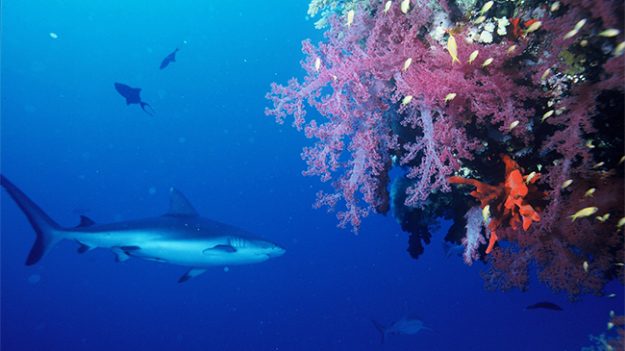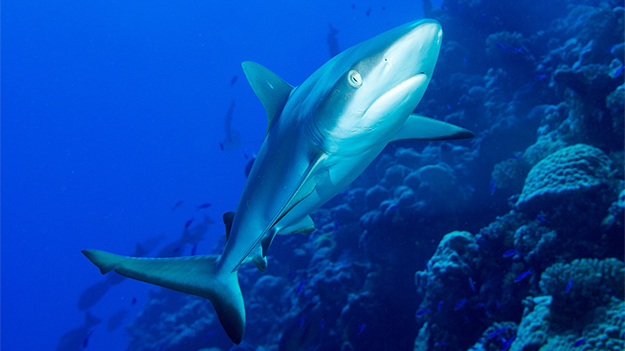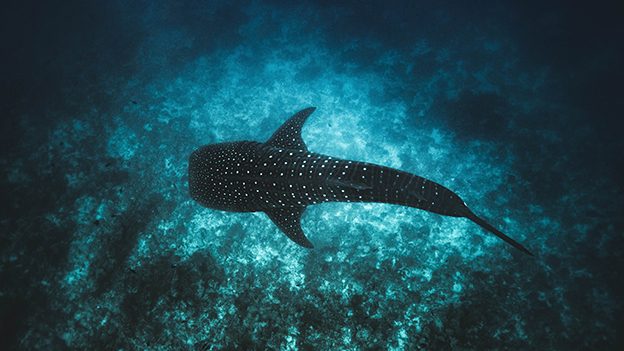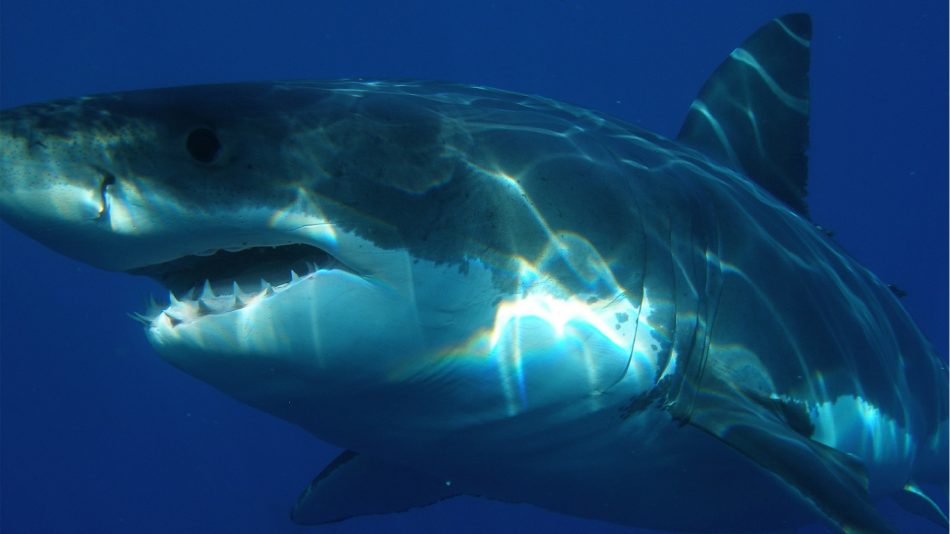Scientists are warning that dozens of shark species may be on the precipice of extinction. But how bad is the situation and what are the potential solutions?
The great white shark is possibly the most feared creature on the planet. With larger females reaching sizes of up to twenty feet, and responsible for more attacks on humans than any of the 470 other shark species, it has entered public consciousness as a fearsome man-eater. However, according to wildlife conservationist Richard Pierce, the cliffs overlooking South Africa’s False Bay offer a disarming sight. “On more than one occasion I’ve seen large white sharks: 3-5 metre white sharks, swimming in amongst swimmers and the swimmers didn’t even know they were there.”
In truth, attacks on humans from great whites, and sharks in general, are relatively rare. In 2018, there was a worldwide total of 66 confirmed, unprovoked bites. Of these, only four proved fatal. That year was by no means an aberration: 2013 to 2017 only averaged 84 incidents per year.
However, what has long been evident is that the persecution of sharks by humans unfolds on a staggering scale. An estimated 100 million sharks are killed every year around the world, for reason ranging from by-catch to overfishing. Particularly notable is the practice of shark finning. The fish are caught, their fins are cut off, and they are thrown back overboard. Sharks need to constantly swim in order to stay alive; therefore, their loss of fins leaves them to sink helplessly to the seabed to suffocate.
They are also killed for their flesh. One of the biggest offenders is Spain’s fishing fleet. The North Atlantic is one of its main preying grounds, a home for species such as makos and blue sharks, for which no catch limits exist whatsoever. “Makos certainly can’t cope with no limits for much longer. And their numbers are probably certain to plummet,” says Pierce. Indeed, makos have been officially announced as at a high risk of extinction, along with dozens of other species.
The reason for this is that makos, as well as other larger, top-of the-food-chain species like the great white, have very low reproductive rates. “We’re talking about maximum 2 or maybe 4 pups at a time. And no one knows exactly the frequency, but probably every couple of years. Their reproductive capability is extremely limited,” said Pierce. “White sharks for example are under mega pressure. Estimates of white shark numbers vary between three, and maybe 6,000. But even 6,000! That’s not many in the whole world. And there’s an error factor of 100%. So that shows you the ignorance we’ve got.” According to Pierce, while blue sharks are better equipped to cope with no-limits, given their ability to produce over a hundred pups at a time, he doubts even they can ultimately cope with them. At the next meeting of CITES (Convention of International Trade in Endangered Species of Wild Fauna and Flora), originally to be held later this month, a record number of sharks and rays will be proposed for listing.

Sharks are massively important to marine ecosystems, given their status as apex predators. In theory, with their extinction, the entire marine ecosystem could become unbalanced.
So are sharks capable of being wiped out for good in the foreseeable future, and how devastating will this be to our oceans? These questions may be harder to answer than one might imagine, as it’s impossible to know just how close to extinction sharks are and what effects this would ultimately unleash.
“Taking out top predators affects carbon in the system, the dispersal of carbon through the food chain, and obviously if you’ve got less organisms at the top of the food chain, there’s going to supposedly be more in the middle, but they tend to be overfished as well,” said Dr Jean-Luc Solandt of the Marine Conservation Society. “I think it’s overegged in terms of what the ecosystem impact of removing top predators is, because we’re also taking out with our fisheries the predators below them. [Although] how they feed, and how they affect animals below them in the food system is definitely a problem, and it’s definitely a disaster.”

The key problem is that our data on the make-up of our ocean’s ecosystems and the decline of sharks is fundamentally incomplete. “The problem we have is we don’t really know what the ecosystem looked like, because we weren’t assessing it before we started taking these large predators out and counting the ecosystem impact,” said Solandt. “We think the baseline of an ecosystem is when we’re born, but in fact, the baseline of the ecosystem was probably when we started industrializing the ocean.”
“It’s quite impossible to forecast when there will be extinctions because no one is really sure about what the attrition rates are; you’d have to know what the population was when the attrition started, so that you could work out how many years you’ve got before it’s all gone,” said Pierce. “And the problem is, if you’ve got elephant or rhino or something, you can count all of them. It’s dead easy. When you’ve got something that is out of sight most of the time, it’s much more difficult, so you have to work off things like fishing records, sightings records, and things like this which are far less reliable than they would be for a land animal.”
Another problem is that catch data is hugely unreliable. Given sharks’ status around the world as an in-threat species, many fishers aren’t reporting their catch figures accurately at all; therefore, all statistics are inherently flimsy.
The entire notion of extinction itself may not be appropriate for these animals. “I would use the term localized extirpation. You’re never going to get rid of all of the animals,” said Solandt. “Extinction is something that happens when you remove habitats on terrestrial ecosystems. A lot of these animals, particularly Mako sharks, are wide-ranging, so they usually find some sort of sanctuary somewhere.”
“People talk about global extinction, but it doesn’t work that way, because for many species you’ve got relatively distinct local area populations. So you could become extinct in area X or Y, but still have animals with viable breeding populations left in area Z,” said Pierce.

This is not necessarily cause for rejoicing, however. “It’s still a disaster for sharks’ situation, obviously. It’s definitely the case that we’ve removed most of the animals out of the ecosystem, and they can’t replace themselves faster than you can take them out,” said Solandt.
Some scientists have suggested that regulating shark fishing could be more effective in saving sharks than banning it outright. However, the enforcement of this may be difficult, and actually getting states to agree to regulations in the first place is another massive hurdle for conservationists. “Unless you get those states that are where those boats land, or where those boats come from, involved in the regulation of such activity, we’re not going to get anywhere. I think there’s just little interest in dealing with these oceanic issues from many other states,” said Solandt.
Could addressing the misconceptions of sharks as man-eaters have any impact on ensuring their protection? Both Solandt and Pierce are deeply skeptical. “The general public may still have this hysterical reaction, or the tabloid press may provoke a hysterical reaction, but those are not the people deciding the fate of sharks,” said Pierce. “The people deciding the fate of sharks have probably got over the stereotype mostly. They’re deciding on the basis of facts and science.”
However, as far as the general public is concerned, changing attitudes may make some difference in promoting shark conservation. However, this is easier said than done. “We the public don’t understand that actually we don’t have a right to recreation in the sea when sharks are already living there. If you came to a game park, you’re not allowed to get out of your car. If you do get out of your car, and a lion comes and eats you, then the lion is very rarely blamed. It’s more the stupid human that got out of his car. If you’re going to go swimming on a beach somewhere and a shark comes up and bites you, the shark is always the villain. But actually, it’s that you got out that car,” said Pierce. “Humans love monsters, and I’m not sure that we actually want sharks to be reasonable guys. I’ve spent the last 30 years trying to break down stereotypes and change attitudes. It’s like trying to push a snowball uphill.”
“I think sharks suffer from two bad labels. In many ways they’re almost more like mammals than they are fish. And the fact that they’re fish means that everyone regards them as food. The other is the monster label, so it’s OK to hurt them, kill them, persecute them, because they gobble up humans. So I think that historically, sharks have had a really bad rap.”

